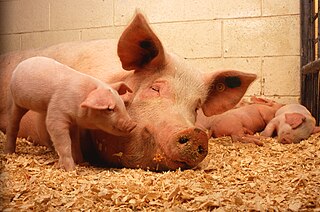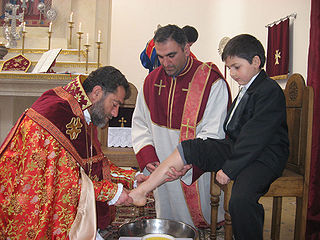
Judaism is an Abrahamic, monotheistic, and widely an ethnic religion. It comprises the collective spiritual, cultural, and legal traditions of the Jewish people, having originated as an organized religion in the Middle East during the Bronze Age. Contemporary Judaism evolved from Yahwism, the cultic religious movement of ancient Israel and Judah, around the 6th/5th century BCE, and is thus considered to be one of the oldest monotheistic religions. Religious Jews regard Judaism as their means of observing the Mosaic covenant, which was established between God and the Israelites, their ancestors. Along with Samaritanism, to which it is closely related, Judaism is one of the two oldest Abrahamic religions.
Kashrut is a set of dietary laws dealing with the foods that Jewish people are permitted to eat and how those foods must be prepared according to Jewish law. Food that may be consumed is deemed kosher, from the Ashkenazi pronunciation of the term that in Sephardic or Modern Hebrew is pronounced kashér, meaning "fit". Food that may not be consumed, however, is deemed treif, also spelled treyf.
Islamic dietary laws are laws that Muslims follow in their diet. Islamic jurisprudence specifies which foods are halal and which are haram. The dietary laws are found in the Quran, the holy book of Islam, as well as in collections of traditions attributed to the Islamic prophet Muhammad.

Halal is an Arabic word that translates to 'permissible' in English. In the Quran, the term halal is contrasted with the term haram. This binary opposition was elaborated into a more complex classification known as "the five decisions": mandatory, recommended, neutral, reprehensible and forbidden. Islamic jurists disagree on whether the term halal covers the first two or the first four of these categories. In recent times, Islamic movements seeking to mobilize the masses and authors writing for a popular audience have emphasized the simpler distinction of halal and haram.
A hechsher or hekhsher is a rabbinical product certification, qualifying items that conform to the requirements of Jewish religious law.

The Council of Jerusalem or Apostolic Council is a council described in chapter 15 of the Acts of the Apostles, allegedly held in Jerusalem around c. 48–50 AD.

In some religions, an unclean animal is an animal whose consumption or handling is taboo. According to these religions, persons who handle such animals may need to ritually purify themselves to get rid of their uncleanliness.

In Judaism, shechita is ritual slaughtering of certain mammals and birds for food according to kashrut.
Kosher foods are foods that conform to the Jewish dietary regulations of kashrut. The laws of kashrut apply to food derived from living creatures and kosher foods are restricted to certain types of mammals, birds and fish meeting specific criteria; the flesh of any animals that do not meet these criteria is forbidden by the dietary laws. Furthermore, kosher mammals and birds must be slaughtered according to a process known as shechita and their blood may never be consumed and must be removed from the meat by a process of salting and soaking in water for the meat to be permissible for use. All plant-based products, including fruits, vegetables, grains, herbs and spices, are intrinsically kosher, although certain produce grown in the Land of Israel is subjected to other requirements, such as tithing, before it may be consumed.
Some people do not eat various specific foods and beverages in conformity with various religious, cultural, legal or other societal prohibitions. Many of these prohibitions constitute taboos. Many food taboos and other prohibitions forbid the meat of a particular animal, including mammals, rodents, reptiles, amphibians, fish, molluscs, crustaceans and insects, which may relate to a disgust response being more often associated with meats than plant-based foods. Some prohibitions are specific to a particular part or excretion of an animal, while others forgo the consumption of plants or fungi.

The practice of vegetarianism is strongly linked with a number of religious traditions worldwide. These include religions that originated in India, such as Hinduism, Jainism, Buddhism, and Sikhism. With close to 85% of India's billion-plus population practicing these religions, India remains the country with the highest number of vegetarians in the world.

Pork is a food taboo among Jews, Muslims, and some Christian denominations. Swine were prohibited in ancient Syria and Phoenicia, and the pig and its flesh represented a taboo observed, Strabo noted, at Comana in Pontus. A lost poem of Hermesianax, reported centuries later by the traveller Pausanias, reported an etiological myth of Attis destroyed by a supernatural boar to account for the fact that "in consequence of these events the Galatians who inhabit Pessinous do not touch pork". In Abrahamic religions, eating pig flesh is clearly forbidden by Jewish (kashrut), Islamic (halal) and Adventist dietary laws.
Hullin or Chullin is the third tractate of the Mishnah in the Order of Kodashim and deals with the laws of ritual slaughter of animals and birds for meat in ordinary or non-consecrated use, and with the Jewish dietary laws in general, such as the laws governing the prohibition of mixing of meat and dairy.

Kosher style refers to foods commonly associated with Jewish cuisine but which may or may not actually be kosher. It is a stylistic designation rather than one based on the laws of kashrut. In some U.S. states, the use of this term in advertising is illegal as a misleading term under consumer protection laws.
The Islamic dietary laws (halal) and the Jewish dietary laws are both quite detailed, and contain both points of similarity and discord. Both are the dietary laws and described in distinct religious texts: an explanation of the Islamic code of law found in the Quran and Sunnah and the Jewish code of laws found in the Torah, Talmud and Shulchan Aruch.
Tza'ar ba'alei chayim, literally "suffering of living creatures", is a Jewish commandment which bans causing animals unnecessary suffering. This concept is not clearly enunciated in the written Torah, but was accepted by the Talmud as being a biblical mandate. It is linked in the Talmud from the biblical law requiring people to assist in unloading burdens from animals.
Jewish vegetarianism is a commitment to vegetarianism that is connected to Judaism, Jewish ethics or Jewish identity. Jewish vegetarians often cite Jewish principles regarding animal welfare, environmental ethics, moral character, and health as reasons for adopting a vegetarian or vegan diet.

In some denominations of Christianity, there are a number of regulations involving cleanliness before prayer, observing days of ritual purification, as well as those concerning diet and apparel. The Bible has many rituals of purification in areas ranging from the mundane private rituals of personal hygiene and toilet etiquette to the complex public rituals of social etiquette.
Ethiopian Jewish cuisine is the cuisine of the Beta Israel. The cuisine of the Ethiopian Jews is similar to the cuisine of other Ethiopians, with some variations.

Shlomo Zev Zweigenhaft was a rabbi who was Rosh Hashochtim of Poland before the Holocaust. After the Holocaust he was Chief Rabbi of Hanover and Lower Saxony. After emigrating to the United States he was a Rav Hamachshir and was described as the "foremost authority on shechita".










